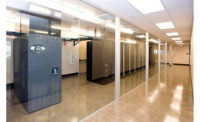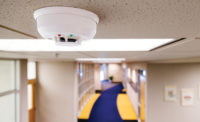
The move towards more security systems based on Internet protocol (IP) has affected not only the equipment itself, but also how that equipment is sold. In addition to traditional security integrators and distributors, IP-based equipment also is being sold through distributors that traditionally have served value-added resellers (VARs) that install, manage and maintain information technology (IT) networks.
SDM interviewed some of these distributors about their involvement with physical security and their strategies in the market.
Tech Data Taps VAR Base
Clearwater, Fla.-based Tech Data has distributed traditional IT networking products for several decades and first got involved with security about five years ago. As Jennifer Bryant, manager of the company’s physical security business unit, explains, “Customers were asking for it and as we look at the market data, the convergence from analog to IP cameras is a huge opportunity for us. We have a strong concentration in IP surveillance cameras and all the accessories around that.”
The company has six physical warehouse locations nationwide, two of which are what Tech Data vice president of marketing John O’Shea calls “configuration facilities.” At those two locations, if a customer requests, Tech Data personnel will configure products prior to shipping them to the customer. For example, O’Shea says, “If someone orders a server and needs a memory upgrade or processor, we can make the hardware adjustment and apply the software image to the hardware so when the equipment shows up, it’s pre-configured based on what the customer requires. They plug it in and it’s ready to go.”
The company has six physical warehouse locations nationwide, two of which are what Tech Data vice president of marketing John O’Shea calls “configuration facilities.” At those two locations, if a customer requests, Tech Data personnel will configure products prior to shipping them to the customer. For example, O’Shea says, “If someone orders a server and needs a memory upgrade or processor, we can make the hardware adjustment and apply the software image to the hardware so when the equipment shows up, it’s pre-configured based on what the customer requires. They plug it in and it’s ready to go.”
Tech Data also provides training and offers private label delivery, where equipment is shipped to the end user with a logo and packing slip from the installing company.
Although Tech Data has some security integrator customers, its customer base – even for security equipment—is comprised primarily of VARs. Out of a global customer base of 100,000 VARs, including 15,000 that purchase on a regular basis, O’Shea says several thousand purchase security equipment.
O’Shea believes Tech Data’s strongest differentiation point is its “depth of knowledge across various networking technologies. We can coordinate across product sets to deliver solutions.”
Anixter Emphasizes Global Strengths
Glenview, Ill.-based Anixter also has its roots in IP equipment but has been selling physical security products since 2000. “At the time, our key focus was video surveillance with an emphasis on the cabling infrastructure, not just simply the cameras,” notes Anixter senior vice president of marketing Steve Leatherwood. “Today we have expanded our product sets to not only include video surveillance but also access control, power, sound and paging and intrusion detection.”
Anixter has thousands of security integrator customers who generate the majority of the company’s security sales, but the company also has been adding a lot of IT specialists, Leatherwood says.
One of Anixter’s unique offerings is its infrastructure solutions laboratory, where the company tests and demonstrates interoperability among various security systems. “We invite our customers to visit the lab for a ‘drive-before-you-buy’ experience with their chosen security solution,” Leatherwood explains. “The lab also conducts research with our manufacturer partners and in some instances, provides recommendations surrounding the design of new products based on feedback we’ve received from our customers or where we feel there is a gap in the market.”
Anixter also offers training, along with bundled offerings known as READY! Deployment services. For example, the READY! Camera offering includes items such as cameras, housings, mounts and lenses as a single solution to speed installation and reduce waste.
As for competitive differentiation, Leatherwood touts Anixter’s expertise and independence, as well as the global nature of the company. The distributor offers local support in 52 countries.
Graybar’s Broad Product Line
In addition to security, which was added in 2006, Graybar Electric Company, St. Louis, emphasizes electrical, communication and automation systems. The migration towards IP was a big factor in making the move into security, notes Melissa Taylor, national product manager for Graybar.
Much of Graybar’s security equipment is sold to companies that also install other Graybar product lines. “Our initial strategy had been to engage with our existing customers,” Taylor says. “However, as we became more involved in the industry, we expanded into working with security integrators and dealers.”
Graybar has more than 240 locations, all of which support physical security, including access control, intrusion, notification and video surveillance equipment. “Our footprint helps set us apart,” Taylor notes.
Graybar’s extensive distribution infrastructure enables it to offer staging for customers who are doing national jobs. “We hold the equipment at a local area for them or ship it to the job site when needed,” Taylor explains. The company also offers training and has a leasing division for customers who prefer that option.
Where Taylor believes the company has the greatest edge, however, is in the wide range of equipment it handles. “The sheer number of building systems we can sell and provide technical support for tends to be the largest differentiator,” Taylor says.
ScanSource Offers Network Assessment
ScanSource, headquartered in Greenville, S.C., started out as a distributor of bar code equipment. But the distribution strategy it brought to that market came straight from the networking world. “Our founder grew and sold a computer product distribution company, then acquired a bar code company to bring two-step distribution to the bar code world,” explains Paul Constantine, vice president of merchandising for ScanSource. The term “two-step” refers to a business model in which manufacturers sell through distributors, who then sell to resellers and integrators.
ScanSource entered the security business in 2004 and focuses primarily on video surveillance and IP-based access control. “Our business model supports the evolution to IP but that’s not all we sell,” Constantine comments. “Sixty-four percent of our business is IP; the rest is analog.”
ScanSource’s main differentiation point is that it combines the efficiencies of a broad line computer distributor with security expertise, Constantine says. Security is one of four business units at ScanSource and, like those other units, it has its own sales force, tech support and management. Many of the company’s security customers are also customers of other business units. “There’s a significant amount of crossover from other vertical markets—network integrators that are familiar with our business model. There are also a good number of telephony dealers who just lived through the shift to IP and see video security as an adjacent market with a low barrier to entry.”
Value-added services that ScanSource offers include training, custom configuration and network assessment—a service that grew out of the company’s telephony business. “With the evolution to voice over IP, there were a lot of quality-of-service issues early on, where networks were not robust enough to handle QOS,” Constantine explains. “We began offering remote and on-site assessment so that before an end user deployed VoIP, they could make sure the network could handle it. It’s the same service when you put video on it. We also generate a report that suggests how the end user can enhance their existing network to make it bullet-proof.”
The service costs about $600 to $700 to the reseller and as Constantine explains, “It’s all transparent to the end user—as far as they’re concerned, the reseller is providing these services.”
As IP becomes more prevalent Constantine believes the security industry will face some of the same issues that occurred in the telephony business. For example, he says, manufacturers increasingly will be driven to sell products online and through retail computer outlets and will need to resolve how to enable that business to peacefully co-exist with the company’s traditional distribution channels. “What we always promote to vendors is that they want to make sure the entity driving demand at the end user level is rewarded for that; otherwise demand generation falls squarely on the manufacturer,” Constantine says, adding, “There’s always room for someone who adds value.”
Looking Forward
SDM asked non-traditional security distributors where they see the next revenue opportunities in security. A common theme is the need for customized solutions.
“We see a large need for additional services such as configuration and testing.”—Melissa Taylor, Graybar
“As we evolve, there will be managed services offerings and more traditional IT offerings that we can offer with a security flair. Now that security systems are sitting on an IP network, you can have it monitored from anywhere—and it’s not just monitoring of video but of the health of the system.”—Paul Constantine, ScanSource
“We will see further convergence of security technology into IP infrastructure and further customization of solutions. Software analytics can do some really cool stuff and that will only continue as the technology gets more and more converged.”—John O’Shea, Tech Data
“The obvious opportunity is converged IP solutions. For us, it’s reminiscent of the early days of networking when a cast of a thousand startups were making competing widgets, and standards were nascent or nonexistent. Companies that can help customers sort through the noise and make sense of the chaos will be the winners.”—Steve Leatherwood, Anixter


